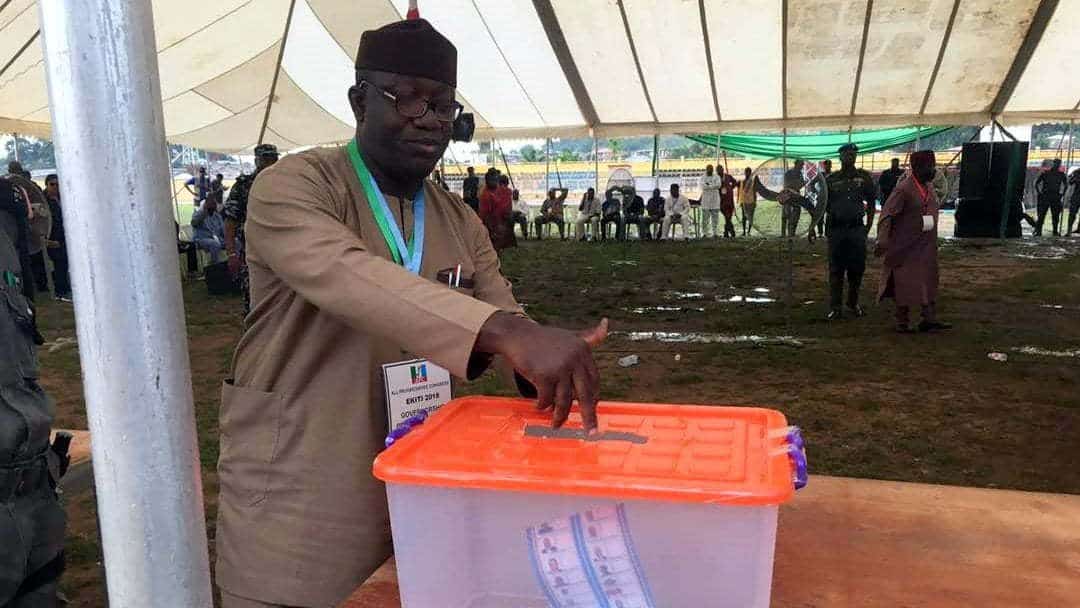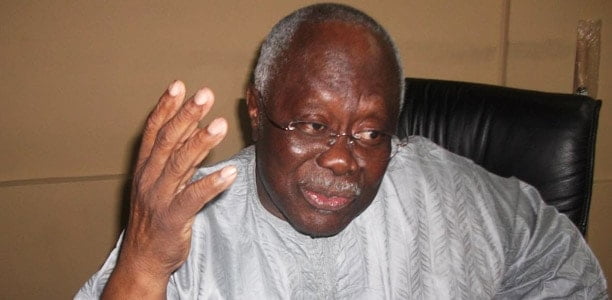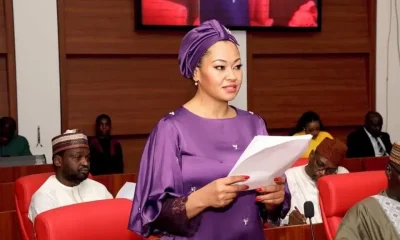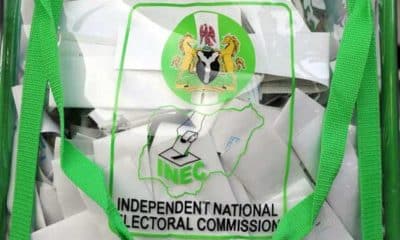Politics
Groups Observe Vote Buying, Anormalies In Ekiti Elections


Fayemi At The Polls (Photo File)
MG, TI, SERAP Condemns Vote-Buying Practice In Ekiti Elections And In Nigerian Elections,
While the Independent National Electoral Commission has said it will probe complaints about the conduct and the outcome of the Ekiti State governorship election, some groups have come out to highlight some factors that may have affected the outcome of the elections.
MG, TI, SERAP Observe Vote-buying in Ekiti Governorship
The Transparency International, the Socio-Economic Right and Accountability Project as well as the Transition Monitoring Group on Monday condemned vote-buying during Saturday’s governorship election in Ekiti State.
The groups, in separate interviews with The PUNCH, said vote-buying, had endangered the country’s democracy and could affect the credibility of the election.
The Police Service Commission also joined in the observation noting that it had received 35 complaints bordering on vote- buying, financial inducement and restiveness in some polling units during Saturday’s Ekiti governorship election.
Condemning the monetisation of the election, TI and SERAP said political parties that were not satisfied with the results must not resort to violence but seek redress at the tribunal.
The Head of TI Nigeria, Musa Rafsanjani, said, “There have been allegations against both parties (the APC and the PDP) of financial inducements of voters. This is a very fundamental problem of the electoral system in the country which political parties and politicians have promoted. This will affect the credibility of the elections. This allegation is not peculiar to only these parties; it is done by all the political parties. The electorate must not allow themselves to be used for money politics.
“The truth of the matter is that Ekiti election started with a lot of uncertainties. There was a lot of insensible politics which made the runoff to the election look like a war.”
On his part, the SERAP Director, Adetokunbo Mumuni, said the monetisation of the electoral process had been in the country for a long time.
He stated, “Let whoever is dissatisfied with the process take the appropriate steps which is to go before the court and try to upturn the election results, but something must be done about the monetisation of the electoral process. It is showing us in a bad light in the view of the international and domestic observers who witnessed the election.”
Confirming the aforementioned issues, a coalition of over 400 civil society organisations, under the aegis of the TMG, said that there was a systemic case of vote-buying and financial inducement of voters in the election.
The TMG, in a statement by its chairperson, Dr. Abiola Akiyode-Afolabi, however, said the election was largely peaceful.
While expressing concern over the massive deployment of security agencies and personnel in the election, he recommended that Nigeria should be working towards a less-policed electoral process in subsequent elections to avoid intimidation and voter apathy.
It said, “The TMG is of the opinion that mobilizing the whole gamut of the country’s security infrastructure is not necessary as this could intimidate voters and further drive voter apathy which is a key concern for the electoral process, looking at the discrepancy between the number of registered voters and those who actually voted.”
Meanwhile, the Police Service Commission in a statement on its assessment of the poll said that its officials led by the Permanent Secretary, Musa Istifanus, revealed that there were few cases of disorder at some polling units.
The commission stated that the police and other security agencies ensured that the election was peaceful.
It stated that its team monitored the conduct of police officers in 45 polling units in all the three senatorial zones of the state covering 14 out of the 16 local government areas of the state.
The commission said that it received allegation of vote-buying by political parties. “The team received 35 complaints from the voters, party agents and observers through dedicated lines earlier circulated to both the electorate and party agents within Ekiti and outside the state.
“Some of the messages centred on vote -buying, financial inducement and restiveness in some polling units. Specifically, there was a case of the arrest and detention of party agents at Aramoko Police Division which was resolved with the intervention of the commission,” the PSC said in the statement by its spokesman, Ikechukwu Ani.
“In cases where a party agent violated the electoral law, the commission advised the police to allow the person to carry out his duty after which he could be arrested after the election.
“The commission wishes to advise that the police, in such instances where an agent commits an offence, he/she be allowed to carry out his legal duties and be arrested at the end of the voting, counting and signing of the result sheet in order to avoid sending a wrong impression that the security agencies may be biased,” it noted.
When contacted for response to the commission’s statement on vote-buying, the police spokesman, Jimoh Moshood, failed to respond to several phone calls.
Punch reports that he has not replied text message inquiring whether the police would investigate the complaints of voters’ inducement by political parties.











